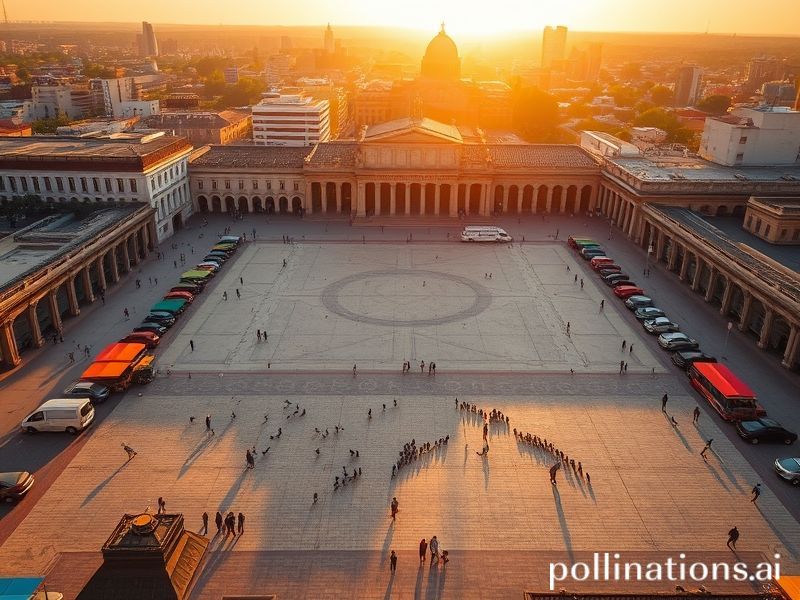Mexico: Globalization’s Favorite Piñata Keeps Spilling Premium Candy
Mexico: The World’s Favorite Punchline That Keeps Punching Back
By Dave’s Foreign-Desk Misanthrope-in-Residence
Mexico wakes up every morning to the sound of three alarm clocks: one made in China, one programmed by Wall Street, and one fashioned from the recycled brass of deported dreams. Each ring reminds the country that its sovereignty is a participatory sport—played on a field stretching from the Sonoran desert to the fluorescent aisles of a Berlin supermarket where organic avocados sell for more than a day’s wage in Oaxaca.
To the north, the United States treats Mexico as both scapegoat and safety valve: simultaneously the source of “bad hombres” and the indispensable supplier of cheap labor and car parts. Washington’s politicians build rhetorical walls so high they obscure the view of their own constituents’ Ford F-150s, 40 % of which are proudly “Hecho en México.” The irony is almost too symmetrical to be funny, like a cartel accountant who moonlights as a DEA consultant.
Across the Atlantic, Europeans sip mezcal in repurposed East-Berlin bunkers and congratulate themselves on discovering “authentic” Mexican culture—never mind that the worm in the bottle was a 1950s marketing gimmick dreamed up by an adman from New Jersey. Meanwhile, Spanish-language Netflix series, filmed in Mexico City soundstages, colonize global eyeballs with narco glamour. The algorithm doesn’t care about decapitations; it cares about retention rates, and nothing keeps viewers glued like a well-timed helicopter raid scored to a narcocorrido remix of “Hallelujah.”
In Asia, Chinese fentanyl precursors and South Korean flat-screen TVs converge on Mexican ports like tourists on spring break—everyone looking for a good time and plausible deniability. Beijing’s diplomats offer Belt-and-Road handshakes while quietly vacuuming up lithium deposits in Sonora, ensuring that future Teslas will run on Mexican rocks refined with coal plants the country swore it would decommission by 2030. Climate change is the rare arena where Mexico can claim moral high ground: the country emits less CO₂ per capita than Luxembourg, proving that underdevelopment can be a carbon offset program nobody asked for.
Still, the peso remains a favorite piñata for currency speculators who like their volatility shaken, not stirred. Every six years, presidential elections promise a “fourth transformation,” a “new republic,” or whatever slogan focus groups haven’t yet beaten to death with focus groups. Investors respond with the enthusiasm of a hungover mariachi being asked to play “Cielito Lindo” one more time. And yet, remittances—those humble wire transfers from dishwashers in Chicago and nannies in Madrid—now outstrip oil revenues, proving that the most reliable pipeline Mexico has ever built is made of WhatsApp messages and tears.
Of course, none of this global theater would be possible without the audience participation of 130 million Mexicans who navigate each day like expert jaywalkers: timing the traffic of corruption, inequality, and occasional hope. They produce the world’s finest graphic novelists, baroque pop stars, and epidemiologists who can calculate R-naught while fixing a carburetor. Their resilience is both admirable and mildly infuriating to foreign correspondents who came looking for a tragedy and found a sitcom with occasional mass graves.
Which brings us to the broader significance: Mexico is the planet’s most instructive case study in how to survive other people’s narratives. It absorbs the plot twists imposed by neighbors, markets, and streaming platforms, then remixes them into new exports—be it a Yalitza Aparicio film, a carne asada taco, or a data-mined migrant workforce. The country reminds us that globalization is less a silk road than a tangled ball of Christmas lights: dazzling, frustrating, and prone to shocking anyone who plugs in without rubber gloves.
So the next time you bite into a perfect guacamole—priced in euros, grown in Michoacán, delivered by an app designed in San Francisco—remember you’re tasting the residue of a geopolitical food fight that Mexico never started but somehow keeps catering. And the enchilada isn’t even the main course; it’s merely the garnish on a banquet where everyone else eats first and Mexico gets the bill.
Bon appétit, mundo. Try not to choke on the irony.







